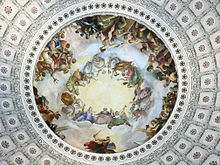

What we see from the current war between Russia and Ukraine, is that the closer someone gets to being a dictator, the more dangerous it becomes that he/she will use the position to lie to his/her people and increase power. But if it is obvious to us that a free democracy is the way to go, why do religious people so often want an absolute dictator, eg. returning King Jesus?
Part of the reason is that religious and secular people have different interpretations of the person. For instance, do you think parents/guardians would want for their adult children that they completely depend on the parents/guardians and never leave the childhood home and obsess over the parent/guardian’s every opinion – or would the grownups’ wish for the child be that he/she grows up, become independent, and learns to have his/her own life?
Certain faiths view the individual as a servant, and the goal is not being free, but going from one kind of servant to another, being a slave to a better master. For instance, we read in the Hebrew Scriptures:
O Lord, I am your servant;
I am your servant, the child of your serving girl.
You have loosed my bonds. (Psalm 116:16)
For Paul in the New Testament, we have an inner principle of goodness, God wrote the law on our hearts (Rom 2:12-16), but Satan is in control of the “fleshly” part of us. But Jesus, the great resister of Satan, because he was resurrected, could take over a believer (if welcomed) in angelic possession, and so there is a transition from being a slave to Satan, to being a slave to God through Christ whose death, so to speak, paid the “ransom” to Satan to free the slaves. Jesus’ death didn’t, as is commonly interpreted, “pay a sin debt” to God, since obviously God wasn’t holding anyone hostage for a “ransom (Mark 10:45),” but Jesus’s death paid the price it took to free the slaves from Satan’s grasp. Paul says:
But anyone united to the Lord becomes one spirit with him. 18 Shun fornication! Every sin that a person commits is outside the body; but the fornicator sins against the body itself. 19 Or do you not know that your body is a temple of the Holy Spirit within you, which you have from God, and that you are not your own? 20 For you were bought with a price; therefore glorify God in your body (1 Cor 6:16-20)
The argument is we go from being a slave to Satan to a slave to God. With Paul above we see that the point is, in his words, that “you are not your own,” and so we are meant to be a slave to an extreme sense: rejecting yourself and becoming simply Jesus incarnate, Christ in you (Colossians 1:27).
The question is, do you want to go from being one kind of slave to another? Usually, if someone comes and wants to be a politician, we would expect them to be democratically elected, have limits in terms of their power, and voluntarily step down from office when their term ends. Should we not expect the same of Jesus if he returns, and is elected? Don’t let titles fool you. Padme in Star Wars was queen, but she was also democratically elected, and had term limits.
ACTIVITY: Watch the Star Wars clip below: “Anakin and Padme: Dictatorship and Democracy.” Consider the figure of Palpatine/Darth Sidious in Star Wars Episode 3: Revenge of the Sith. Write and illustrate a dystopian comic about how a democratic society might will their own repression and come to elect a dictator.
Reflection Question: Does Star Wars reflect a Utopia or a Dystopia when the Jedi are in charge?